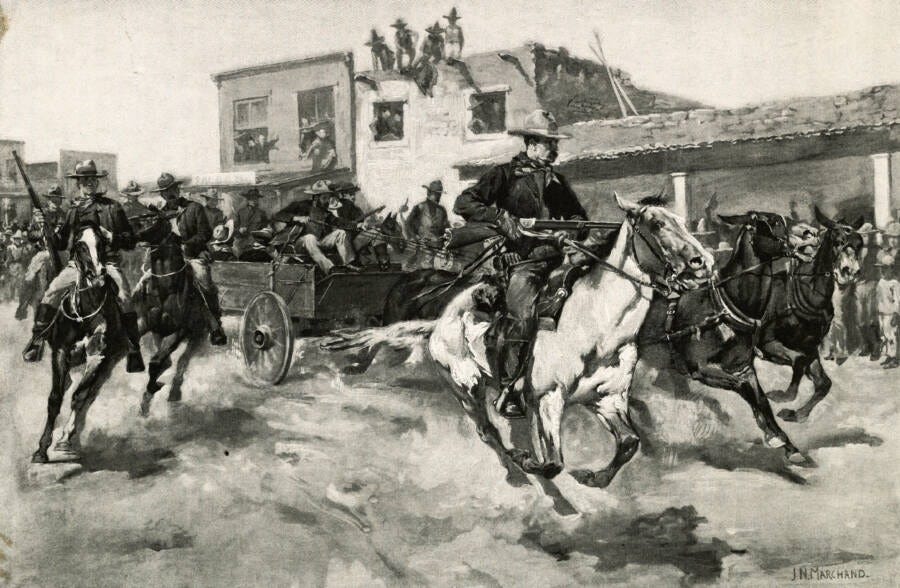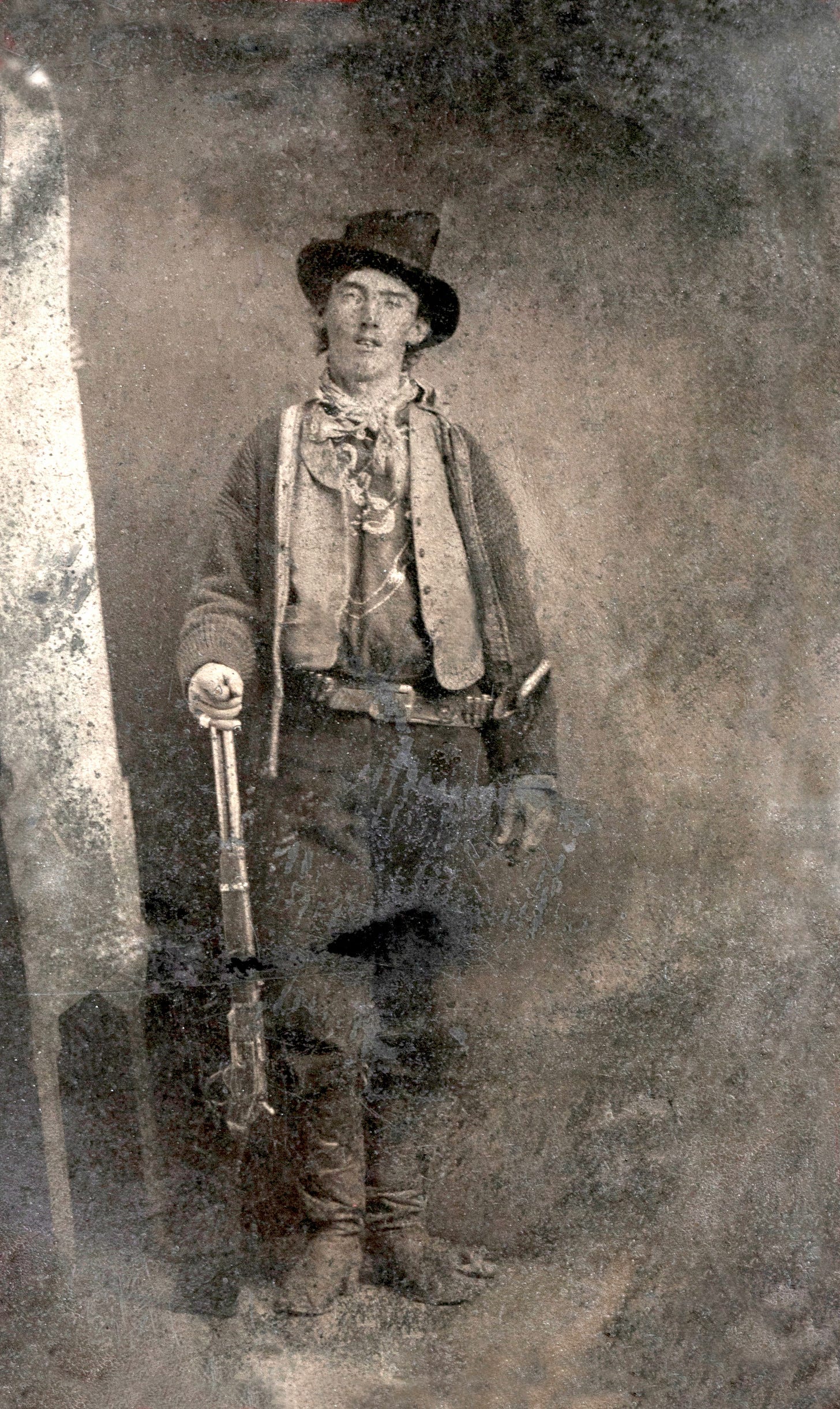February 18 - The Price of Business: New Mexico’s Lincoln County War Begins
Old Feuds, New Lessons: Transcending Revenge Today
This is the day John Tunstall was murdered in 1878, igniting the Lincoln County War.
In today's devotional, we will delve into the turbulent saga of the Lincoln County War, exploring the destructive nature of vengeance. How does this historical conflict mirror our own struggles with revenge in modern life? What does the Bible teach us about overcoming the urge for retribution and embracing a path of forgiveness and peace?
"Do not repay anyone evil for evil. Be careful to do what is right in the eyes of everyone. If it is possible, as far as it depends on you, live at peace with everyone. Do not take revenge, my dear friends, but leave room for God’s wrath, for it is written: 'It is mine to avenge; I will repay,' says the Lord." - Romans 12:17-19 (NIV)
This Date in History
In the late 1870s, Lincoln County, New Mexico, became the center of an escalating conflict that would etch its name in the annals of American history. This struggle, known as the Lincoln County War, was rooted in a rivalry over economic interests, specifically in the lucrative markets of dry goods and cattle.
The existing power structure in Lincoln County was dominated by James Dolan, who ran a virtual monopoly through a general store popularly known as "The House." This status quo was challenged in 1876 when John Tunstall, an English entrepreneur, and his business partner Alexander McSween, backed by influential cattleman John Chisum, opened a rival establishment. This move not only threatened Dolan's commercial dominance but also upset the delicate balance of power in the region.
The rising tension between these factions was more than a simple business rivalry; it evolved into a full-blown conflict, drawing in lawmen, local businessmen, and even criminal elements. Dolan's faction had the support of the local Sheriff, William Brady, and further muscle was provided by the Jesse Evans Gang, a group of outlaws known for their ruthlessness.
In response, Tunstall and McSween formed their own group of defenders, the Lincoln County Regulators. This posse included not just Tunstall's ranch hands but also lawmen sympathetic to their cause, such as town constable Richard M. Brewer and Deputy U.S. Marshal Robert A. Widenmann. This group's composition reflected the complex web of alliances and loyalties that characterized the conflict.
The simmering tension boiled over with the murder of John Tunstall by members of the Evans Gang. This act of violence was not just a personal attack but a declaration of war, setting off a chain of revenge killings. The Regulators, seeking justice for Tunstall's murder, retaliated by killing Sheriff Brady and others in a series of violent confrontations.
These incidents were just the beginning of a series of deadly encounters that would continue for months. The most significant of these was the Battle of Lincoln, a five-day siege marked by intense gunfights. This battle culminated in the death of McSween and the eventual disbanding of the Regulators.
The aftermath of this war saw a shift in the law enforcement landscape of Lincoln County. In 1880, Pat Garrett was appointed County Sheriff. Garrett, a former bartender and buffalo hunter, was determined to restore order. His most famous act was the pursuit and eventual killing of Billy the Kid, a key member of the Regulators, along with two other former members. Garrett's relentless pursuit of Billy the Kid and the final confrontation between the two became legendary, symbolizing the end of an era in the American West.
The Lincoln County War, with its web of alliances, betrayals, and revenge killings, not only reshaped the power dynamics in Lincoln County but also left an indelible mark on the mythology of the American Frontier.
Historical Context
The Lincoln County War, far from being an isolated incident, was a manifestation of the broader socio-economic and political turmoil that characterized the American West in the late 19th century. This period was marked by rapid expansion, lawlessness, and the struggle for control over scarce resources. The war's roots lay in the economic transformation that was sweeping through the region, particularly in New Mexico. The cattle industry, a linchpin of the economy, was undergoing significant changes, with increasing competition and disputes over land and water rights.
The establishment of "The House" by James Dolan in Lincoln County represented the growing trend of monopolistic control over local economies, which was common across the West. These economic powerhouses often had deep political connections, allowing them to wield considerable influence over local law enforcement and governance. This intersection of business and politics set the stage for conflicts like the Lincoln County War, where disputes over economic interests quickly escalated into violence.
Another contributing factor was the cultural and societal milieu of the American Frontier. This era was characterized by a rugged individualism and a code of honor that often placed personal justice and retribution above the law. In this context, the murder of John Tunstall was more than a criminal act; it was seen as a direct challenge to the honor and standing of his associates, necessitating a response in kind.
Furthermore, the period was marked by the diminishing influence of traditional law enforcement in the face of rapid expansion and the challenges of policing vast, remote areas. This often resulted in communities taking justice into their own hands, as seen with the formation of the Regulators. The Lincoln County War, therefore, was a reflection of the broader challenges facing a society in transition, struggling to establish order and justice in a rapidly changing world.
Did You Know?
One of the lesser-known figures in the Lincoln County War was Susan McSween, the wife of Alexander McSween. Following her husband's death in the conflict, Susan became a prominent businesswoman and landowner in New Mexico. She successfully navigated the male-dominated world of the American West, becoming known as the "Cattle Queen of New Mexico." Her resilience and business acumen helped shape the post-war economic landscape of the region.
Today’s Reflection
In reflecting on today's theme, the sin of revenge and the pursuit of vengeance, we find a poignant intersection with the historical narrative of the Lincoln County War and the Scriptural guidance provided in Romans 12:17-19. This passage, underscored by the Apostle Paul's exhortation to refrain from repaying evil for evil and to live at peace, offers a profound framework for understanding the complexities and dangers inherent in the pursuit of vengeance.
The Lincoln County War, a conflict steeped in retribution and personal justice, serves as a vivid reminder of the destructive path revenge can carve. John Tunstall's murder and the subsequent spiral of violence initiated by the Regulators highlight a fundamental truth: vengeance, while often rooted in a desire for justice, can quickly devolve into a cycle of unending conflict and pain. This historical event mirrors the Biblical caution against revenge, a sentiment echoed in Proverbs 20:22: "Do not say, 'I'll pay you back for this wrong!' Wait for the Lord, and he will avenge you."
Our reflection on this theme is not merely a historical or theological exercise; it bears direct relevance to our lives today. The impulse for revenge, whether in response to personal slights or larger injustices, is a challenge we all face. Yet, as Christians, we are called to a higher standard – one that favors forgiveness and reconciliation over retribution. The words of Christ in Matthew 5:44, "But I tell you, love your enemies and pray for those who persecute you," provide a counter-narrative to the world's endorsement of revenge.
This call to resist vengeance is not a denial of the pain or wrong that might have been experienced. Rather, it is an acknowledgment of a profound Biblical truth: vengeance belongs to the Lord. In Deuteronomy 32:35, God declares, "It is mine to avenge; I will repay." This relinquishment of personal retribution does not signify weakness; instead, it is a powerful act of faith, trusting that God’s justice, unlike human vengeance, is perfect and righteous.
In practical terms, forgoing vengeance can manifest in various ways in our daily lives. It might mean extending forgiveness to someone who has wronged us, choosing to respond with kindness in the face of hostility, or actively working towards reconciliation in strained relationships. These actions are not always easy; they require humility and a deep reliance on God's grace. However, in doing so, we not only obey God's command but also open the door to healing and peace.
As we reflect on the Lincoln County War and its legacy of vengeance, let us commit to embodying the Biblical principles of peace and forgiveness. In a world that often glorifies revenge, let us be beacons of God’s love and mercy, remembering always that "Vengeance is mine; I will repay, says the Lord." (Romans 12:19). This commitment to live out our faith in this way can transform not only our own hearts but also the world around us.
Practical Application
Reflect on a situation where you felt wronged or harmed. Instead of harboring resentment or thoughts of retribution, consciously choose to release these feelings. Write a letter of forgiveness (which you don't need to send) to this person, expressing your choice to forgive. This act isn't about condoning the wrong, but about freeing yourself from the burden of bitterness and aligning your heart with God's command for forgiveness.
Closing Prayer
Heavenly Father, guide us to understand the depths of Your grace and to emulate it in our lives. Help us to resist the temptations of revenge and bitterness, and to walk in the path of forgiveness, just as You have forgiven us. May our hearts be aligned with Your will, fostering peace and reconciliation in our relationships and communities. Amen.
Final Thoughts
The saga of the Lincoln County War and its ensuing cycle of revenge serve as a powerful reminder of the futility and destruction that comes from vengeance. As followers of Christ, we are called to a higher standard - one of forgiveness, peace, and reconciliation. Let us strive to embody these virtues, transforming our hearts and the world around us.
Community Engagement
I love hearing from readers each day. Don’t worry, this isn’t a test—I promise! Feel free to drop a line or two in the comments below. You can answer one of the following questions, share your own reflections, pose a new question, or simply say hello. I can’t wait to hear from you!
What are your thoughts on the Lincoln County War?
How do you personally cope with feelings of revenge or resentment?
In what ways can we practically apply the principle of forgiveness in our daily lives?
What does it mean to you to "leave room for God’s wrath"?
In tomorrow's devotional, we will delve into the subtle yet significant impact our daily choices have on those around us. Discover how the story of an infamous figure from history can illuminate our understanding of spiritual influence and responsibility.







Wonderful article Mr. Clark! New Mexico is a beautiful state, one that I've been fortunate to visit on several occasions, although I have never been to Lincoln County.